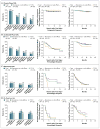A phase 2 trial of ponatinib in Philadelphia chromosome-positive leukemias
- PMID: 24180494
- PMCID: PMC3886799
- DOI: 10.1056/NEJMoa1306494
A phase 2 trial of ponatinib in Philadelphia chromosome-positive leukemias
Abstract
Background: Ponatinib is a potent oral tyrosine kinase inhibitor of unmutated and mutated BCR-ABL, including BCR-ABL with the tyrosine kinase inhibitor-refractory threonine-to-isoleucine mutation at position 315 (T315I). We conducted a phase 2 trial of ponatinib in patients with chronic myeloid leukemia (CML) or Philadelphia chromosome-positive acute lymphoblastic leukemia (Ph-positive ALL).
Methods: We enrolled 449 heavily pretreated patients who had CML or Ph-positive ALL with resistance to or unacceptable side effects from dasatinib or nilotinib or who had the BCR-ABL T315I mutation. Ponatinib was administered at an initial dose of 45 mg once daily. The median follow-up was 15 months.
Results: Among 267 patients with chronic-phase CML, 56% had a major cytogenetic response (51% of patients with resistance to or unacceptable side effects from dasatinib or nilotinib and 70% of patients with the T315I mutation), 46% had a complete cytogenetic response (40% and 66% in the two subgroups, respectively), and 34% had a major molecular response (27% and 56% in the two subgroups, respectively). Responses were observed regardless of the baseline BCR-ABL kinase domain mutation status and were durable; the estimated rate of a sustained major cytogenetic response of at least 12 months was 91%. No single BCR-ABL mutation conferring resistance to ponatinib was detected. Among 83 patients with accelerated-phase CML, 55% had a major hematologic response and 39% had a major cytogenetic response. Among 62 patients with blast-phase CML, 31% had a major hematologic response and 23% had a major cytogenetic response. Among 32 patients with Ph-positive ALL, 41% had a major hematologic response and 47% had a major cytogenetic response. Common adverse events were thrombocytopenia (in 37% of patients), rash (in 34%), dry skin (in 32%), and abdominal pain (in 22%). Serious arterial thrombotic events were observed in 9% of patients; these events were considered to be treatment-related in 3%. A total of 12% of patients discontinued treatment because of an adverse event.
Conclusions: Ponatinib had significant antileukemic activity across categories of disease stage and mutation status. (Funded by Ariad Pharmaceuticals and others; PACE ClinicalTrials.gov number, NCT01207440 .).
Conflict of interest statement
No other potential conflict of interest relevant to this article was reported.
Figures

Comment in
-
Overcoming resistance to targeted anticancer drugs.N Engl J Med. 2013 Nov 7;369(19):1852-3. doi: 10.1056/NEJMe1311325. Epub 2013 Nov 1. N Engl J Med. 2013. PMID: 24180495 No abstract available.
-
Ponatinib in Philadelphia chromosome-positive leukemias.N Engl J Med. 2014 Feb 6;370(6):577. doi: 10.1056/NEJMc1315234. N Engl J Med. 2014. PMID: 24499221 No abstract available.
-
Ponatinib in Philadelphia chromosome-positive leukemias.N Engl J Med. 2014 Feb 6;370(6):577. doi: 10.1056/NEJMc1315234. N Engl J Med. 2014. PMID: 24499222 No abstract available.
Similar articles
-
Ponatinib in refractory Philadelphia chromosome-positive leukemias.N Engl J Med. 2012 Nov 29;367(22):2075-88. doi: 10.1056/NEJMoa1205127. N Engl J Med. 2012. PMID: 23190221 Free PMC article. Clinical Trial.
-
Ponatinib: A new tyrosine kinase inhibitor for the treatment of chronic myeloid leukemia and Philadelphia chromosome-positive acute lymphoblastic leukemia.Ann Pharmacother. 2013 Nov;47(11):1540-6. doi: 10.1177/1060028013501144. Epub 2013 Nov 21. Ann Pharmacother. 2013. PMID: 24265264 Review.
-
Ponatinib: a review of its use in adults with chronic myeloid leukaemia or Philadelphia chromosome-positive acute lymphoblastic leukaemia.Drugs. 2014 May;74(7):793-806. doi: 10.1007/s40265-014-0216-6. Drugs. 2014. PMID: 24807266 Review.
-
Clinical outcomes in patients with Philadelphia chromosome-positive leukemia treated with ponatinib in routine clinical practice-data from a Belgian registry.Ann Hematol. 2021 Jul;100(7):1723-1732. doi: 10.1007/s00277-021-04507-x. Epub 2021 May 4. Ann Hematol. 2021. PMID: 33942128 Free PMC article.
-
Ponatinib efficacy and safety in Philadelphia chromosome-positive leukemia: final 5-year results of the phase 2 PACE trial.Blood. 2018 Jul 26;132(4):393-404. doi: 10.1182/blood-2016-09-739086. Epub 2018 Mar 22. Blood. 2018. PMID: 29567798 Free PMC article. Clinical Trial.
Cited by
-
The hazards of rapid approval of new drugs.Aust Prescr. 2016 Feb;39(1):2-3. doi: 10.18773/austprescr.2016.005. Epub 2016 Feb 1. Aust Prescr. 2016. PMID: 27041795 Free PMC article. No abstract available.
-
Dose Justification for Asciminib in Patients with Philadelphia Chromosome-Positive Chronic Myeloid Leukemia with and Without the T315I Mutation.Clin Pharmacokinet. 2024 Sep;63(9):1301-1312. doi: 10.1007/s40262-024-01411-1. Epub 2024 Sep 7. Clin Pharmacokinet. 2024. PMID: 39243304 Free PMC article. Clinical Trial.
-
Characterization of FGFR signaling pathway as therapeutic targets for sarcoma patients.Cancer Biol Med. 2016 Jun;13(2):260-8. doi: 10.20892/j.issn.2095-3941.2015.0102. Cancer Biol Med. 2016. PMID: 27458533 Free PMC article.
-
BCR-ABL tyrosine kinase inhibitor (TKI)-induced nephropathy: An under-recognized phenomenon.Leuk Res Rep. 2020 Jun 8;14:100211. doi: 10.1016/j.lrr.2020.100211. eCollection 2020. Leuk Res Rep. 2020. PMID: 32637309 Free PMC article. No abstract available.
-
Unveiling the Cardiotoxicity Conundrum: Navigating the Seas of Tyrosine Kinase Inhibitor Therapies.Cancer Control. 2024 Jan-Dec;31:10732748241285755. doi: 10.1177/10732748241285755. Cancer Control. 2024. PMID: 39318033 Free PMC article. Review.
References
-
- Deininger M, O’Brien SG, Guilhot F, et al. International randomized study of interferon vs STI571 (IRIS) 8-year follow-up: sustained survival and low risk for progression or events in patients with newly diagnosed chronic myeloid leukemia in chronic phase (CML-CP) treated with imatinib. Blood. 2009;114(Suppl):1126. abstract.
-
- Hochhaus A, O’Brien SG, Guilhot F, et al. Six-year follow-up of patients receiving imatinib for the first-line treatment of chronic myeloid leukemia. Leukemia. 2009;23:1054–61. Erratum, Leukemia 2010;24: 1102. - PubMed
-
- Shah NP, Cortes JE, Schiffer CA, et al. Four-year follow-up of patients with chronic-phase chronic myeloid leukemia (CP-CML) receiving 100 mg of dasatinib once daily. J Clin Oncol. 2010;28(Suppl):6512. abstract.
-
- Sprycel (dasatinib) tablet for oral use: prescribing information. Princeton, NJ: Bristol-Myers Squibb; Oct, 2011.
Publication types
MeSH terms
Substances
Associated data
Grants and funding
LinkOut - more resources
Full Text Sources
Other Literature Sources
Medical
Research Materials
Miscellaneous
